WELLFLEET — Barbara Austin got her first horse, Duchess, when she was 10. The two went everywhere together, and their trust in each other was absolute.
At Wellfleet’s kettle ponds, Austin could park Duchess in the water and use her back as a diving board. She could sit on Duchess’s head, and Duchess would raise it, sliding Austin down onto her back. Austin could even ride Duchess standing up.
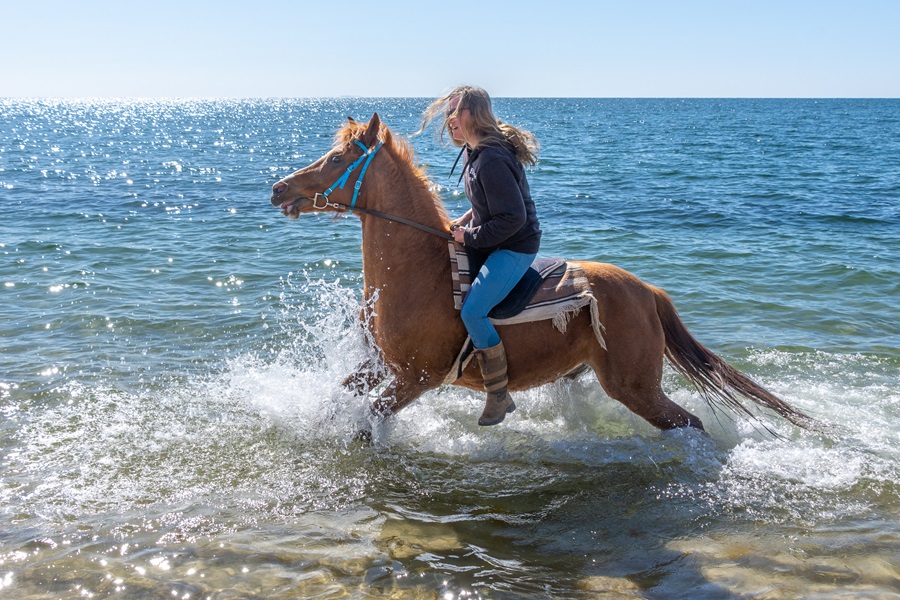
“I think after having that kind of experience with your first horse, you’re never going to not have a horse,” says Austin.
For the past 54 years, alongside her prodigious career as an oysterman, Austin has kept horses one way or another in Wellfleet — usually right in the back yard of her house off Route 6. She is one of a loosely connected but dedicated group of people — most of them women — who have continued to keep horses even as farms have become few and far between here.

When she was young, Austin says, “most of the guys had minibikes and most of the girls had horses.” Mounted on their modes of transport of choice, they would ride all over the Outer Cape from Great Island to Nauset Road and as far north as Provincetown.
Today, Austin has two horses: Cody, a 32-year-old Morgan-quarter horse cross that Austin got in exchange for five bushels of oysters, and Luna, a 15-year-old Welsh mountain pony.
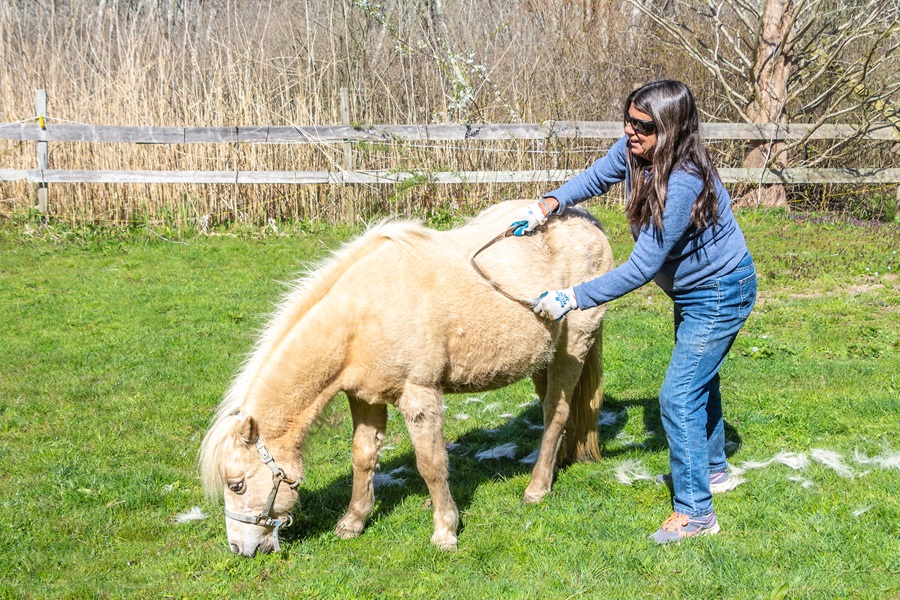
“There used to be a big group of us that all had horses here in Wellfleet,” she says. But as her group ages, she adds, there are fewer horsewomen coming up behind them. “Property has been becoming more expensive, so it’s become harder and harder to find a place to keep a horse,” says Austin.
According to Wellfleet Health and Conservation Dept. records, the town issued stable permits to 10 properties in the past four years. So far in 2024, there are only eight active permits.
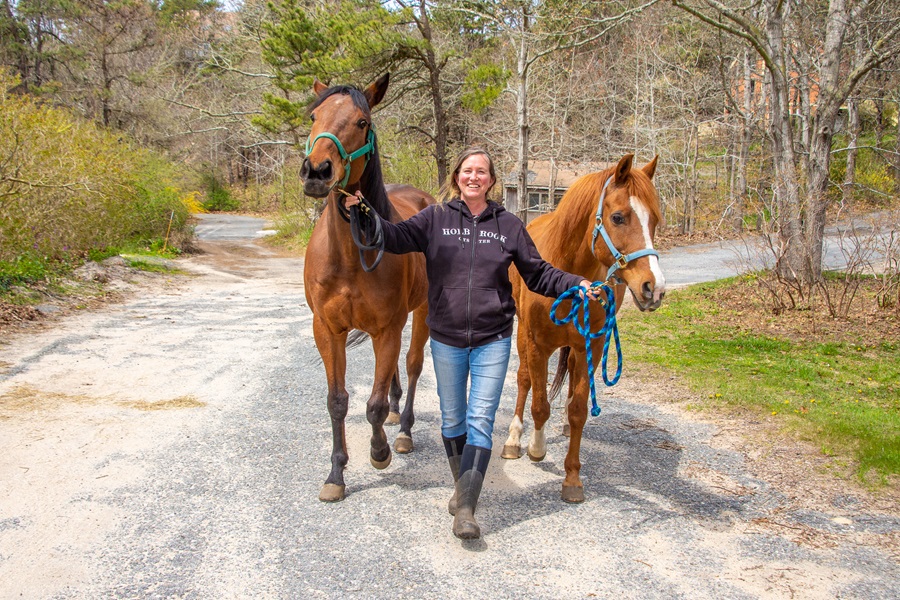
Pilar Clements and her husband, oyster farmer Jacob Dalby, feel lucky to have found the right house for keeping horses in Wellfleet. Clements, a Texas native who spent summers in Wellfleet, where she met Dalby, is from a horse-riding family outside Austin. So, when they found a red house with a paddock already built in the front yard on Peace Valley Road, they knew it was home.
Today, the paddock is home to Theo, a thoroughbred descendant of two triple-crown champions, including the famous Secretariat, and Adriano, a chestnut Arabian.
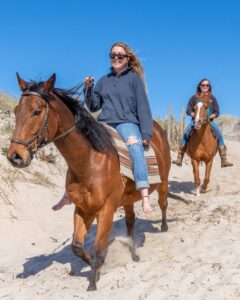
The two horses keep the couple busy. Every day, Clements wakes up at 6:30 a.m. to give Theo and Adriano their first helping of hay. The pen must be scooped for poop, which accumulates at the rate of roughly one wheelbarrowful per day. They compost it for neighbors who use it in their gardens. Every eight weeks, the horses’ shoes must be replaced. Once a year, a veterinarian comes to tranquilize Theo and Adriano so that their back teeth can be filed down, a practice called “floating” that prevents horses’ teeth from becoming too long and impeding digestion.
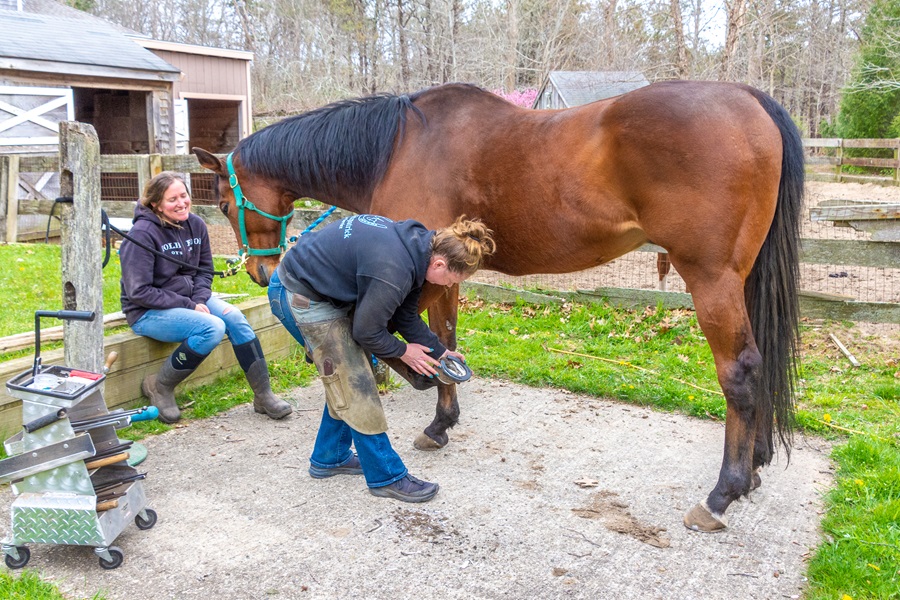
Keeping horses is not inexpensive, especially on the Outer Cape. The farrier, Alisha Fitzpatrick, comes from Rochester; the large animal veterinarian drives from Plymouth. Food is expensive, and horses eat a lot. Clements says she gets a good deal— $10 per bale — on hay, but the two horses eat a bale a day.
For Clements and Dalby, however, the labor and costs are worth it. Theo and Adriano are a constant source of entertainment. The couple watch from their second-floor window as Theo and Adriano trot and play in the front yard. Their daughter, Ferran, is an avid horsewoman, too. And about twice a week, they ride.

On their rides, which can be 5 to 10 miles long, Clements says they are not just passengers but stewards of the trails. The family maintains the old dirt paths that snake through the woods, often clearing stray branches for hikers, cyclists, and other equestrians who use the paths.
“There’s nothing more freeing than being on a horse,” says Nora Clark-Jennings, who lives on Old Kings Highway in Wellfleet and whose quarter horse, Woody’s Wish, lives in the barn in her front yard. She rides to see the sunrise over the ocean and the sunset over the bay.
Clark-Jennings grew up in Wellfleet and was inspired to keep horses by her dad, who was from Arkansas. Though Woody’s Wish sometimes “acts like a little kid,” she says, he was named after her late father, Laymon Woodrow “Woody” Clark Sr.
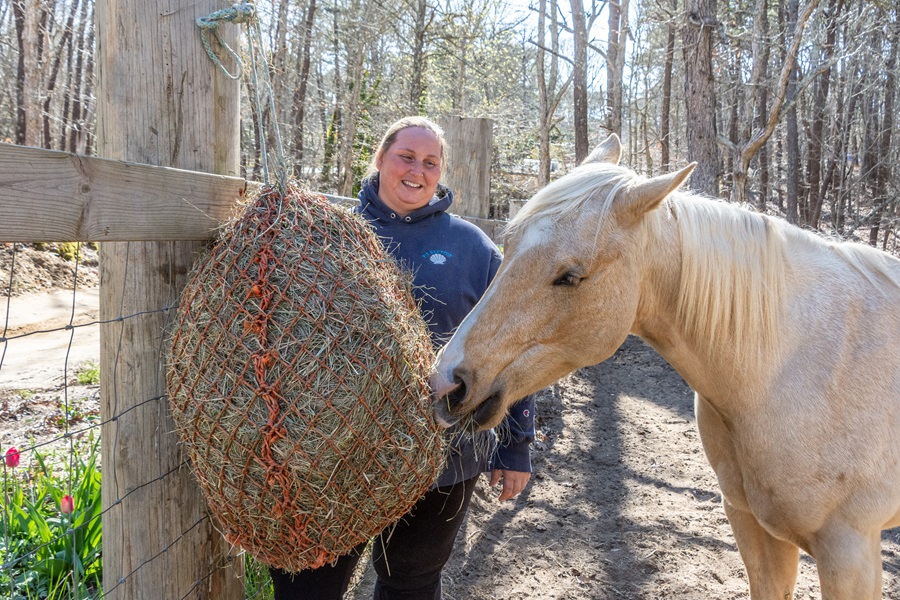
“I grew up with my dad’s stories,” says Clark-Jennings. Those stories, and being with horses now, take her back to a different time.
The evidence of modern-day life, however, is hard to keep at bay on horseback. Austin, Clements, Dalby, and Clark-Jennings all say that they encounter the occasional obnoxious driver, especially on Route 6, which they must travel to get to certain trails.
Austin and Clements both say they have had run-ins with overzealous park rangers who warned them that horses are not allowed in the National Seashore. One told Austin it was because horses count as vehicles. Clements says she was told her horse violated a “no pets” rule. A representative from the Cape Cod National Seashore told the Independent in an email that “horseback riding at the Seashore isn’t super common, but it is permitted.”
In many ways, that mixup reflects the general understanding of horse culture on the Outer Cape: it’s uncommon enough that some doubt whether it’s even allowed, but there are few rules against it.
The town of Wellfleet has some regulations. Permits are required, and stables must be checked once a year to make sure the animals are healthy and that their waste is being disposed of properly. Abutters must also give their permission for a new stable to be authorized.
But otherwise, the feeling of freedom Clark-Jennings describes seems to define the experience.
Once a woman in a BMW with New York plates rolled her window down in astonishment when she saw Clements and Dalby riding on Route 6. “Horses? You can have horses on Cape Cod?” she asked.
“It’s a free country,” said Clements. “You can have horses anywhere.”



